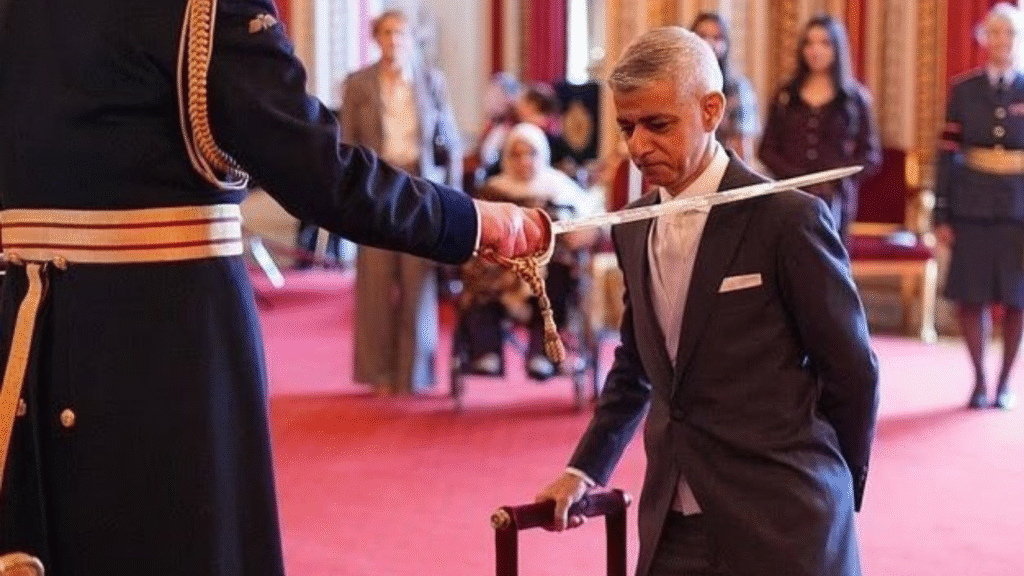Sadiq Khan, London’s Mayor since 2016, was knighted by King Charles III in June 2025, sparking heated debate across the UK. The honor, meant to recognize political and public service, has been labeled by critics as a “reward for failure” and a slap in the face to Londoners grappling with rising crime and social tensions. As the first Muslim mayor of a major Western city, Khan’s knighthood is seen by some as a nod to diversity, but others view it as a misguided decision by the Labour government and the monarchy, ignoring serious issues like knife crime, grooming gangs, and cultural divides. This article explores Khan’s tenure, the UK’s changing demographics, and why honoring him has ignited such fury, especially among those concerned about law and order, community safety, and the targeting of specific groups like Hindus and anti-Khalistani Sikhs.
The Knighthood Announcement and Public Reaction
On June 10, 2025, Sadiq Khan received his knighthood at Buckingham Palace, a moment he called “humbling” for himself and his Pakistani immigrant family. The honor, part of the New Year Honours list, was meant to celebrate his three terms as mayor. But the decision sparked outrage. A Change.org petition to block the knighthood gathered over 200,000 signatures, with critics like Tory councillor Matthew Goodwin-Freeman calling it “a kick in the teeth” for Londoners. Social media erupted, with posts on X branding Khan a “nightmare mayor” and questioning the monarchy’s judgment. Many felt the Labour government, led by Keir Starmer, was prioritizing political loyalty over merit, further eroding trust in the honors system.
Why the Backlash?
The backlash stems from Khan’s record. Critics point to a 61% rise in knife crime, a 70% council tax hike, and policies like the Ultra Low Emission Zone (Ulez) that have angered drivers. Victims’ families and campaigners, like Suzanne Hedges, whose son was stabbed to death, called the knighthood “insulting” to those affected by crime. The Conservative Party, including Shadow Home Secretary Chris Philp, labeled it a “reward for failure,” arguing Khan has failed to address London’s spiraling issues.
The Monarchy’s Role
King Charles III personally bestowed the knighthood, reportedly joking with Khan about being workaholics. But this lighthearted moment didn’t sit well with critics who see the monarchy as out of touch. By approving the honor, the King has been accused of endorsing a divisive figure, raising questions about the royal family’s role in political decisions. Some argue the monarchy should have rejected the nomination to avoid fueling public anger.
Sadiq Khan’s Tenure: Promises vs. Reality
Khan, elected in 2016, campaigned on making London safer, greener, and more affordable. As the first Muslim mayor, he broke barriers, but his policies have drawn criticism. Knife crime has surged, with a 38% increase in stabbings since he took office. The Metropolitan Police has been placed in special measures, and transport strikes have disrupted daily life. Critics argue Khan deflects blame, focusing on progressive causes like renaming Overground lines to reflect “diverse communities” while ignoring core issues like public safety and housing shortages. His supporters, like Foreign Secretary David Lammy, praise his social mobility story, but many Londoners feel his leadership has left the city in chaos.
The Knife Crime Crisis
Knife crime has become a defining issue under Khan. Since 2016, London has been dubbed the “knife crime capital,” with a 61% rise in incidents. Campaigners like Courtney Barrett, who founded Binning Knives Saves Lives, say Khan has ignored pleas to address stabbings. Over 1,300 knives have been taken off streets by volunteers, not police, highlighting a perceived leadership vacuum. Critics argue Khan’s focus on amnesties and youth programs hasn’t stemmed the tide of violence.
Economic Burdens on Londoners
Khan’s policies, like Ulez and congestion charge hikes, have hit working-class Londoners hard. Council tax has risen by 70%, and rent prices are up 35% since 2016. Critics say these costs, paired with public transport fare increases, make life unaffordable for many. The “West London Orbital” rail plan and Overground rebranding, costing £6.3 million, are seen as wasteful when basic services falter. Many feel Khan prioritizes optics over practical solutions.
UK’s Changing Demographics and Social Tensions
The UK’s demographic landscape has shifted dramatically, with ethnic minorities now making up over 18% of the population, per recent census data. London is even more diverse, with nearly 40% of residents from non-white backgrounds. This shift has brought cultural richness but also challenges. Critics argue that rapid immigration, particularly from Muslim-majority countries, has strained social cohesion. Khan, as a prominent Muslim figure, is often at the center of debates about integration, with some accusing him of favoring certain communities over others, fueling perceptions of division in the capital.
Rising Community Conflicts
Tensions between communities have grown, with reports of Muslims targeting Hindus and anti-Khalistani Sikhs in the UK. In 2022, Leicester saw violent clashes between Hindu and Muslim groups, with social media amplifying divisive rhetoric. Anti-Khalistani Sikhs, who oppose the separatist movement, have reported harassment in cities like London and Birmingham. Critics claim Khan’s leadership has done little to address these conflicts, instead promoting a “diversity” narrative that glosses over real issues. This has led to accusations that he’s out of touch with the broader public.
Perceptions of Favoritism
Khan’s background as a Pakistani Muslim has been weaponized by critics who claim he prioritizes Muslim communities. Policies like increased mosque funding and community outreach programs are seen by some as pandering, especially when other groups, like Hindus and Sikhs, feel neglected. Posts on X have called Khan a “jihadi” mayor, reflecting a fringe but vocal sentiment that his leadership exacerbates cultural divides rather than bridging them.
The Grooming Gangs Controversy
One of the most damning criticisms of Khan’s tenure is his handling of grooming gangs, which have been a persistent issue in the UK. Reports from Rotherham, Bradford, and other cities have exposed organized groups, often of Pakistani descent, sexually exploiting vulnerable teenage girls. In a heated 2025 City Hall exchange, Khan dodged questions from Tory leader Susan Hall about grooming gangs in London, asking her to “define” the term repeatedly. Reform UK’s Alex Wilson called this “outrageous,” accusing Khan of not taking the issue seriously. Critics argue his reluctance to address this fuels distrust.
Public Outcry and Inaction
The grooming gang scandals have left a scar on public trust. Families of victims, mostly white working-class girls, feel ignored by authorities, including Khan. The Labour Home Secretary Yvette Cooper announced £10 million for reviews in 2025, but critics like Chris Philp called it “inadequate.” Khan’s refusal to directly acknowledge the issue in London has led to accusations that he’s protecting certain communities at the expense of justice for victims.
Cultural Sensitivities and Silence
Khan’s defenders argue he avoids the topic to prevent inflaming tensions, given the sensitive nature of linking crime to specific communities. But this silence is seen by many as cowardice, especially when victims’ families demand action. The perception that Khan sidesteps these issues to maintain his progressive image has deepened public frustration, with some X posts labeling him a “shameless jihadi” for allegedly prioritizing politics over safety.
Law and Order: A City in Chaos?
London’s law and order situation has deteriorated under Khan, critics say. The Metropolitan Police, under his oversight as Police and Crime Commissioner, has faced scandals, from racist officers to misogyny in the ranks. Robberies are up 10%, gun crime 30%, and violent crime with injury 5%, per police data. Tube strikes and vandalism, like graffiti on trains, add to the sense of a city slipping out of control. Khan’s critics argue his focus on “woke” initiatives, like renaming transport lines, distracts from addressing these core issues, leaving Londoners feeling unsafe.
Police in Crisis
The Met Police’s placement in special measures in 2022 highlighted systemic failures. Khan has clashed with Conservative ministers over funding, but critics say he hasn’t used existing resources effectively. Facial recognition technology has shown some success, but its limited rollout hasn’t curbed crime rates. Victims’ advocates, like Suzanne Hedges, argue Khan’s inaction on policing has left communities vulnerable, making his knighthood feel like a mockery.
Public Transport Woes
Khan’s transport policies, like Ulez and fare hikes, have sparked protests. Vandals have targeted Ulez cameras, and commuters face frequent strikes. The £6.3 million Overground rebrand, with names like “Windrush” and “Suffragette,” was mocked as “woke nonsense” when reliability remains poor. Critics argue Khan’s focus on symbolic gestures over practical fixes shows a disconnect from everyday Londoners’ struggles.
Criticism of the UK Government and Monarchy
The decision to knight Khan has put the Labour government and King Charles III under scrutiny. Keir Starmer’s first honors list, including Khan and Emily Thornberry, has been accused of rewarding party loyalists. A petition with over 200,000 signatures called the knighthood a “reward for failure,” reflecting distrust in Starmer’s judgment. The monarchy, by approving the honor, is seen as complicit in endorsing a divisive figure. Critics argue the King should have rejected the nomination to maintain public trust, especially amid rising social tensions.
Labour’s Political Maneuvering
Starmer’s government has been accused of using honors to shore up political allies. Khan’s knighthood, alongside Thornberry’s damehood, is seen as a move to solidify Labour’s base, particularly among minority communities. But this has backfired, with X posts calling it “nepotism” and “party first, country second.” The government’s failure to address grooming gangs and crime effectively has only fueled perceptions of misplaced priorities.
The Monarchy’s Misstep
King Charles III’s personal involvement in the ceremony has drawn ire. By knighting Khan, the monarchy is seen as out of touch with Londoners’ struggles. Critics argue the royal family should distance itself from political controversies, especially when honoring someone as polarizing as Khan. The decision has reignited debates about the relevance of the honors system in a modern, divided UK.
The “Jihadi” Label and Its Implications
The term “jihadi” has been flung at Khan by critics, particularly on X, where users like @TRobinsonNewEra called him “disgraced” and accused him of “destroying” London. This inflammatory label, rooted in his Muslim background, reflects a broader narrative among some right-wing groups that Khan’s leadership promotes chaos and favors certain communities. While supporters argue this is racist dog-whistling, critics point to his record on crime and community tensions as evidence of failure. The label, though extreme, underscores the deep polarization surrounding his knighthood.
Social Media’s Role
X has been a battleground for opinions on Khan’s knighthood. Posts like @MartinDaubney’s call for public thoughts on the “furious backlash” highlight the divide. Supporters see Khan as a symbol of diversity, while detractors, like @RafHM, call him “the worst politician in living memory.” The platform amplifies these sentiments, turning the knighthood into a lightning rod for broader debates about identity and governance.
The Danger of Polarization
The “jihadi” label risks escalating tensions, particularly when Hindus and Sikhs report feeling targeted. Khan’s failure to address these specific community conflicts has fueled perceptions of bias. While he’s apologized for past remarks, like calling moderate Muslims “Uncle Toms,” his critics argue he hasn’t done enough to unify London’s diverse population, making the knighthood a flashpoint for deeper cultural divides.
What Does This Mean for London’s Future?
Khan’s knighthood has exposed fault lines in the UK’s social and political fabric. With crime rising, communities clashing, and trust in institutions eroding, many question whether honoring Khan sends the wrong message. His supporters argue he’s a trailblazer who’s made London greener and more inclusive, but critics see a mayor who’s failed on basic governance. The Labour government and monarchy’s decision to elevate him risks further alienating a public already frustrated with leadership. As London navigates its complex demographic shifts, the knighthood debate underscores the need for leaders who prioritize safety and unity over symbolic gestures.
A Call for Accountability
Critics demand Khan take responsibility for London’s challenges, from knife crime to transport chaos. His knighthood, seen as unearned, has galvanized calls for a merit-based honors system. Victims’ families and campaigners want concrete action, not honors, to address the city’s woes. The government and monarchy must heed these calls to restore public faith.
Bridging the Divide
London’s future depends on addressing community tensions and crime head-on. Khan’s leadership must focus on uniting diverse groups, not fueling division. The knighthood controversy highlights the need for transparent governance that prioritizes all Londoners, regardless of background, to prevent further chaos and restore trust in the city’s institutions.



